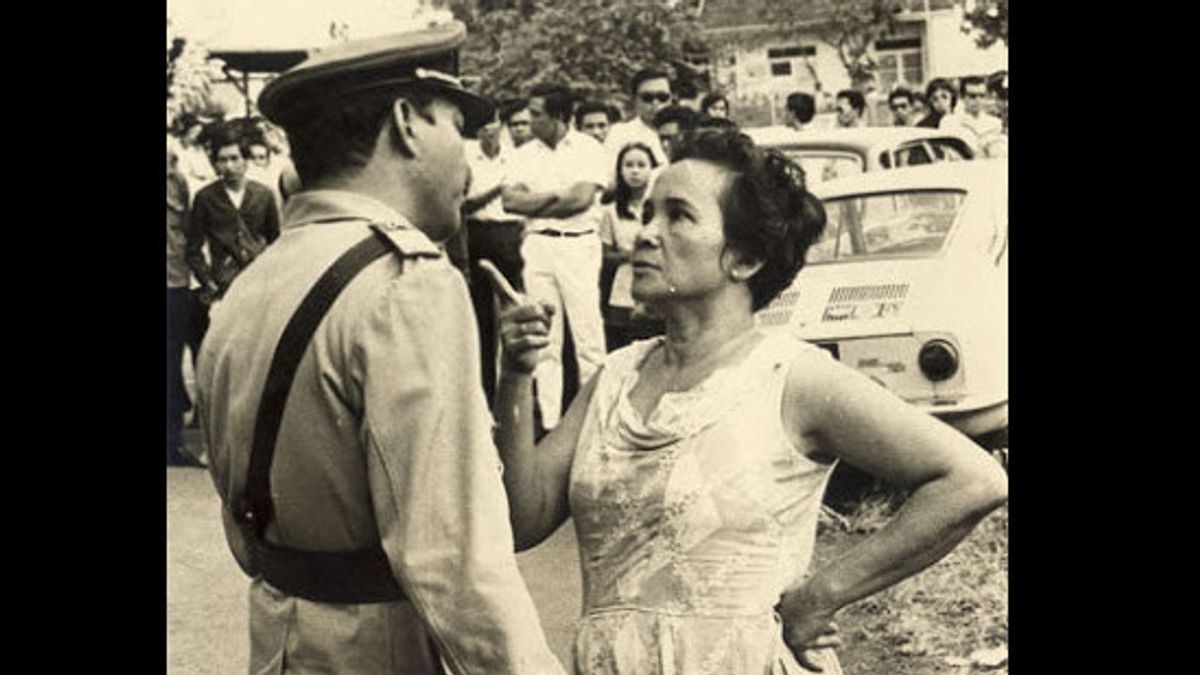
JAKARTA - Police action to spread violence has made many Indonesians restless since the New Order (Orba) era. The shooting of Rene Louis Conrad, for example. The Bandung Institute of Technology (ITB) student was not only attacked by cadets of the Police Academy. He was shot dead. The people grieve, but justice has not been served. Even though some have been named as defendants, some say the real killer is still ashes to this day.
It all started with the chaotic ban on long hair. In the New Order era, long hair was like a big sin. Suharto saw the long-haired youth as an act of defiance. This perspective was taken because the New Order identified long hair as an imported or westernized product.
Long hair does not at all reflect the nation's culture. Therefore, in order to save the nation's children from the touch of outside culture, long hair was banned in 1966.
Efforts against longish people carried out by the New Order are no joke. Police personnel were deployed to break the chain of long-haired youth. The police often raid those who have long hair.
In its implementation in Bandung, the police also involved cadets from the Sukabumi Police Academy as additional personnel in enforcing the rules. Because, young people with long hair are often seen as troublemakers and onverschillig (indifferent). Owners of long hair are even criminalized for not getting access to public services.
“People with long hair are not allowed to receive services in state institutions. In the police, for example. The management of driving licenses, performance permits, meeting permits, or G30S free certificates will not be served if the applicant is still long-haired," said Aria Wiratma Yudhistira in the book Dilarang longish!: New Order's Practice of Power Against Young People in the Early 1970s (2010).
Orba's arbitrary treatment drew criticism. Young people, especially students and college students, continue to criticize the government's actions which actually take care of trivial matters such as long hair. In fact, at that time the condition of the country was in a bad condition.
Young people consider many other issues more important. Moreover, corruption has become rampant, the fuel price hike has made the people miserable, and the government's lack of transparency in carrying out lighthouse projects, such as the construction of the Taman Mini Indonesia Indah.

For students, the ban on long hair is like a violation of individual human rights. The action of cutting long hair among students was pointed out by many parties as evidence that the New Order government was narrow-minded. Alias the steps taken are far from effective.
The government only tends to show off power, rather than solving problems. Therefore, the method of eradicating long hair is likened to eradicating criminals or criminals is a reckless option. Nor is it human.
“They ruthlessly cut the hair of the raid victims, even though these victims protested. In addition to students and students, there are ITB lecturer assistants who are also victims. The police have generalized that those with long hair are criminals by themselves,” wrote Rum Aly in the book Crossing the Paths of Authoritarian Military Power (2004).
Friendly matchTensions between students and police in Bandung are running high. The students and lecturers of ITB began to criticize the action against longish people. The students responded to the action against long hair by initiating a movement: anti fat people.
The movement was made to directly satirize the government, which mostly contains fat-bellied officials. The movement continued with small clashes between students and cadets from the Sukabumi Police Academy, class of 1970.

The hot tension immediately reached the ears of high-ranking police officers. The National Police Chief General Hoegeng Imam Santoso, the Governor of the Police Academy, Inspector General Awaludin Djamin, and the entire ITB community to universities throughout Bandung gathered to find a solution. After that, the National Police took the initiative to hold a friendly football match, between ITB students and Police Academy cadets. To end the feud, he said.
A friendly match was then held on the football field in the middle of the ITB campus on October 6, 1970. The home team outperformed the cadets of the Police Academy 2-0. The 2-0 advantage made the home fans feel the upper hand.
They then issued a lot of complaints in the form of spicy innuendo to the police cadets who were spectators and became the security of the match. Clashes are unavoidable. The cadet provos immediately tried to discipline the audience with Koppel rim (military belts) slashes.
The match continued despite the sound of gun shots. Victory is also in the hands of the ITB team. The cadets were eventually expelled by the committee to return to their respective trucks for violating the rules: bring firearms.
Shot of Rene ConradIn fact, the cadets of the Police Academy didn't go home right away. They had indeed left the campus grounds, but then stopped at Genesha Street in front of the ITB student dormitory F canteen. Nahas, a student majoring in mining ITB with his friend passed in front of a truck carrying cadets.
The student who rode a Harley Davidson was then involved in verbal abuse with the cadets. It seems that grudges with students after the clashes are still stuck in the hearts of every cadet. In the end, the passing students became the target of beating the cadets of the Police Academy. Not satisfied just hitting. The student was shot dead by one of the cadets. The student who became the victim was Rene Louis Conrad. The other students ran away.
“While riding his big Harley Davidson motorcycle, Rene came to the back of one of the trucks that was loading the cadets, and cursed the cadets from the top of his motorcycle. Suddenly gunshots rang out from the direction of the truck, and Conrad fell to his knees; then woke up but was soon ganged up by the cadets who came back down from his truck. Rene ran, but they were chased together and hit by the clutch rim.”
“There were also several gunshots aimed at the nearby Student Dormitory. Rene Conrad's body, which had fallen several times, was lifted and placed by the cadets in a police pickup. The car carrying Rene's body then drove with the group. Some time later the body of Rene Conrad was found on the side of the road in front of the Police Station on Jalan Merdeka," said Sri Bintang Pamungkas in the book Change Regime Change System (2014).
The incident then tarnished the face of the Police. Violence within the Indonesian National Police is considered by all the Indonesian people to be ingrained. Moreover, acts of violence are not only perpetuated by active police, but prospective police officers are also perpetuating violence. This incident then made General Hoegeng confused. As the number one person in the National Police, Hoegeng has the responsibility to restore the image of the Police which was shattered after the death of Rene Conrad.
Hoegeng acted. But what power. His business foundered. It is said that there is a great power protecting a line of Police Academy cadets. However, Hoegeng believes the cadets did gang up and even opened fire. This belief persisted until Hoegeng was overthrown by Suharto on October 2, 1971.
Strangeness appeared. Even though he died as a result of the actions of the cadets, the person who became the suspect was a police brigadier, Djani Maman Surjaman. Djani actually had nothing to do with the beatings. Not even hitting. let alone shoot. Somehow the law sentenced Djani to 1 year and 6 months in 1972. The trial alibi revealed Djani's "negligence" as the main cause of the death of Rene Louis Conrad.
“Although the Conrad case may create a bad image for the police, it should be understood that as a matter of fact the matter is not easy to approach. The cadets who do the shooting, intentionally or not, as humans have various motivations in carrying out the shooting."
“The shooting case cannot be seen alone. At least it has to do with the mass fights that preceded it, then to what extent did it encourage further developments, including the shooting of Rene Louis Conrad, an ITB student,” concluded Hoegeng as written by Abrar Yusra and Ramadhan KH in the book Hoegeng: Police Idaman and Reality (1993).
*Read other information about HISTORY or read other interesting articles from Detha Arya Tifada.
Other MEMORIESThe English, Chinese, Japanese, Arabic, and French versions are automatically generated by the AI. So there may still be inaccuracies in translating, please always see Indonesian as our main language. (system supported by DigitalSiber.id)








